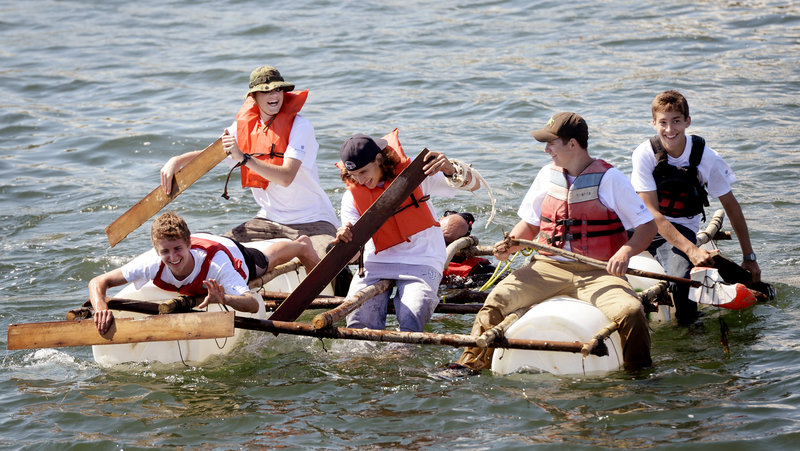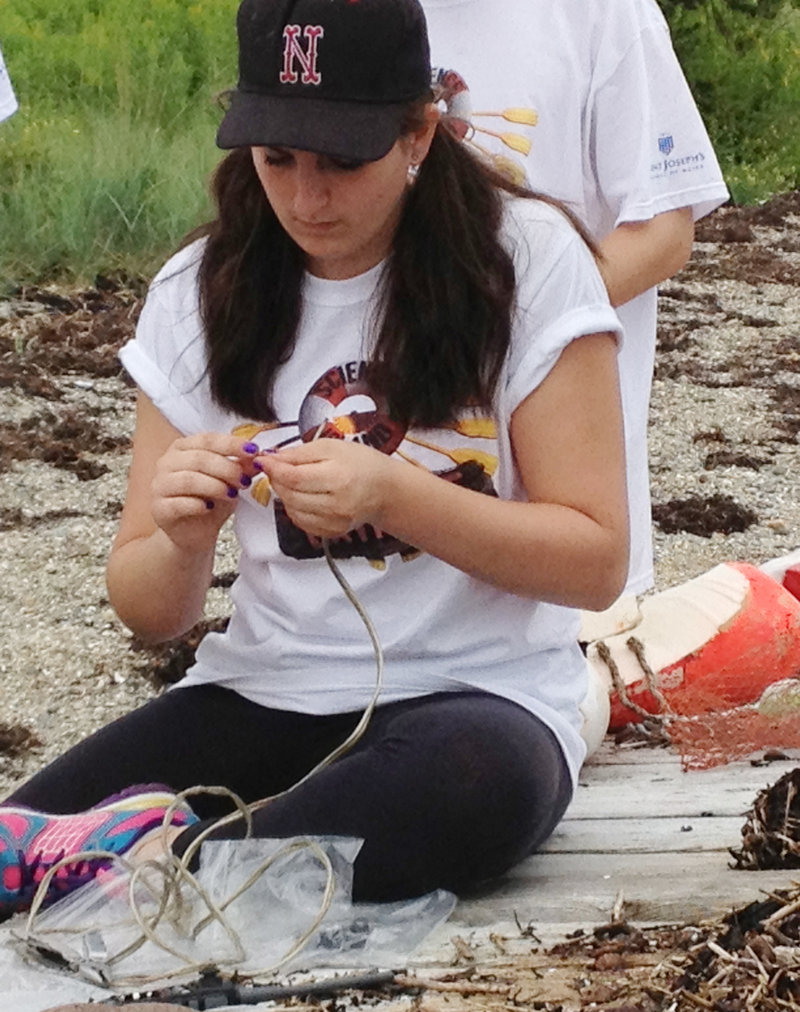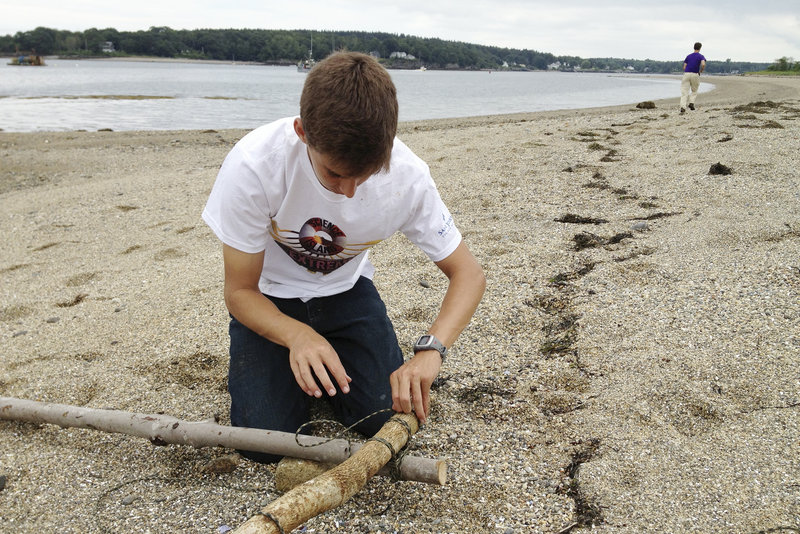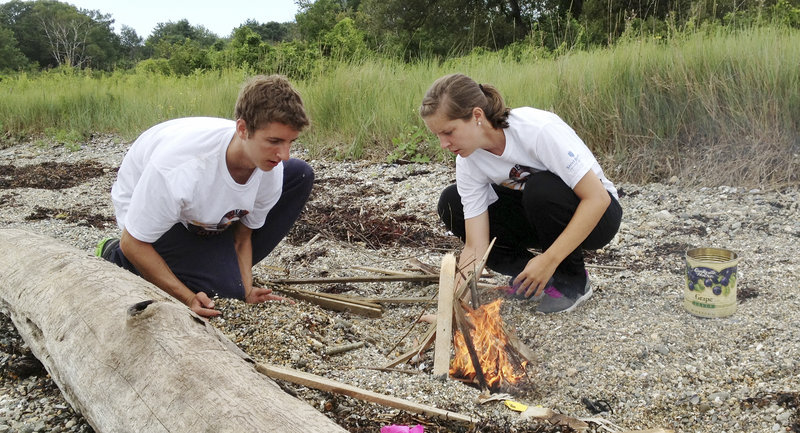LITTLE CHEBEAGUE ISLAND — A week ago, the 21 high school juniors and seniors from all over the Northeast hadn’t met each other.
By week’s end, they were shipwrecked together on an uninhabited island in Casco Bay and forced to survive.
The first Science Island Extreme, the brainchild of Bonny Eagle High School science teacher Russel Taylor, culminated Friday with a “Survivor”-like experience for teenagers whose only prior connection was their interest in science and math.
They didn’t have to eat bugs or fend off predators, but they did have to use their science, technology, engineering and math acumen to compete a variety of tasks before they were “rescued” by the Coast Guard and Portland firefighters.
For the professionals, it was a valuable training exercise. For the students, it was a one-of-a-kind summer camp experience for which they will get college credit.
“We didn’t really know what to expect, but it’s gone perfectly,” said Taylor late Friday from a beach on Little Chebeague Island, just south of its developed sister, Great Chebeague Island.
All week, the students prepared for the simulated shipwreck at St. Joseph’s College in Standish, the camp’s home base.
Lynn Brown, the school’s dean of enrollment, said camp organizers worked hard to find a diverse group of kids for the inaugural Science Island Extreme. The faculty was diverse, too, including Taylor; well-known Maine entrepreneurs Mike and Geoff Howe; two Portland firefighters with military backgrounds, Michael Mutchie and Wade Ward; Nancy Cripe, a science teacher from Minnesota; and Jonathan Hare, a British scientist featured in the BBC documentary TV series “Rough Science.”
The week of training at St. Joseph’s was valuable, but the coup de grace of the camp was Friday’s excursion.
It started about 11 a.m., when a barge that normally hauls freight from the mainland to Casco Bay’s islands picked up the 21 students at Portland’s East End boat launch.
The barge cut smoothly through the water as islands passed, first Peaks Island, then Little and Great Diamond islands, then Long Island. The students got their instructions.
They would be split into two teams once they reached the island. Each team would have to complete an identical series of tasks:
• Start a fire without matches or accelerants.
• Find edibles in the woods and along the shore.
• Build a makeshift raft with fallen limbs and empty barrels.
• Build a lean-to.
• Fix a broken radio and then transmit a rescue message in Morse code.
• When the barge hit land, the two teams scattered.
For the next four hours, each group methodically completed the tasks. Every once in a while, frustration was heard in their voices when things didn’t go perfectly. Then, they talked it out and solved the problem as a team.
“These guys are great. This is the most hustle I’ve seen from them all week,” said Ward, one of the two Portland firefighters.
Perhaps the most striking thing about the sight of 21 teenagers in one place was the absence of cellphones, iPads and laptops.
Brianna Russell of Falmouth and Tyler Sym of Lexington, Mass., were in charge of keeping the fire going long enough to boil water and cook the sea creatures they found: crabs and periwinkles mostly, plus a couple of mussels.
Sym used a flint to spark birch bark, then added small twigs and later larger branches that Russell had gathered. When it came time to eat, Russell politely declined. They had been shipwrecked for only about three hours. She wasn’t that hungry.
Galen DuBois of Woolwich, Adam Josselyn of Oxford Hills and Ryan McLaughlin of Kingston, N.H., built the raft and later got to paddle it from the shore to the rescue boat a couple hundred feet offshore.
Mario Conte of Long Island, N.Y., and James Patchell of Standish built a lean-to.
“Do you remember how to tie the right knot?” Patchell said when the time came to connect the two sides.
“I think so,” Conte replied.
Beth Ventura of Carlisle, Mass., and Elliott Twilley of Gorham had to figure out how to power an old hand-held radio by using the crank mechanism from a power drill. No problem.
Once the distress signal was sent, the students waited for their rescuers. The Portland Fire Department’s fireboat and a smaller Coast Guard vessel arrived a short time later and escorted them back to the mainland.
The students didn’t talk much on the boat ride back. They looked mostly tired, tanned and satisfied.
Eric Russell can be contacted at 791-6344 or at: erussell@pressherald.com
Twitter: @PPHEricRussell
Send questions/comments to the editors.







Success. Please wait for the page to reload. If the page does not reload within 5 seconds, please refresh the page.
Enter your email and password to access comments.
Hi, to comment on stories you must . This profile is in addition to your subscription and website login.
Already have a commenting profile? .
Invalid username/password.
Please check your email to confirm and complete your registration.
Only subscribers are eligible to post comments. Please subscribe or login first for digital access. Here’s why.
Use the form below to reset your password. When you've submitted your account email, we will send an email with a reset code.